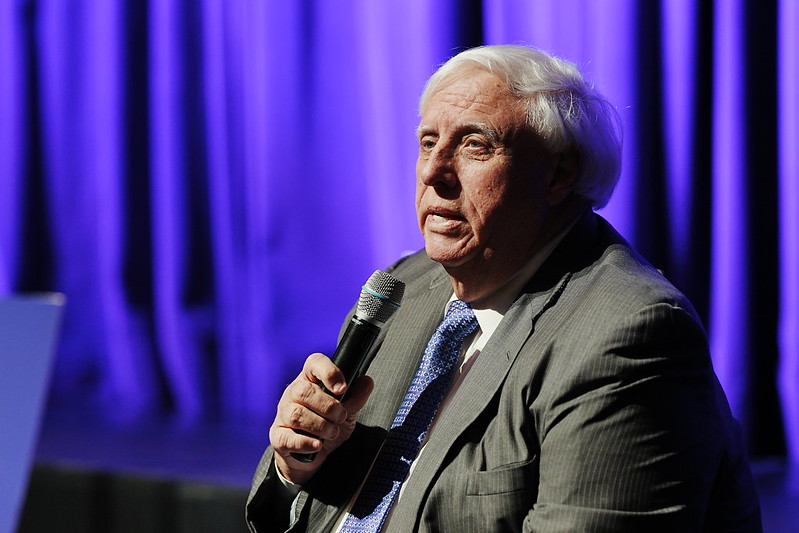Amendment Four on West Virginia ballots this fall would give authority to legislators to review the policies and guidelines of the state Department of Education. Right now that oversight responsibility lies with members of the state Board of Education, and all but one have been appointed by Gov. Jim Justice.
But the governor, who has consistently described education as the centerpiece of his two-term administration, has not taken a sharp position on Amendment Four.
That’s in contrast to his daily campaign in communities across the state against another ballot measure, Amendment Two, which would give legislators the authority to exempt categories of personal property taxes. With Amendment Two, the governor has described the influence of “the swamp” as influencing lawmakers to favor tax cuts for big out-of-state corporations through favors like campaign donations.
Asked last week about Amendment Four, the governor talked in relatively neutral terms. He said the education officials who currently oversee policy in West Virginia are generally trustworthy. But he also said there are sometimes policies that are lightning rods and that West Virginia wouldn’t want to be like California.
“Well, I’ve got an opinion,” Justice said. “I don’t know if it’s nearly as clear or maybe that I can, you know, articulate.”
“Here’s my whole thing,” Justice continued. “You know, we’re not California. And really, our educators, the folks in our education department, whether it be our board or superintendent or whoever it may be, for the most part, these are really good people. And they’re grounded and their thoughts are sound and solid as they can be.”
On the other hand, the governor said, “I guess we don’t know what we’re going to run into and who’s going to be elected, who’s going to be appointed, whatever may come about. So from that standpoint, giving some level of oversight to our legislators who are good and solid and wise and hopeful, we sure don’t want to have situations to where, basically, what’s going on in a California where you have rogue people in departments of education that are coming up with ideas that are subjecting children to things we would not want our children subjected to.”
Justice did not specify policy concerns, including those in California, but said “there are real, real, real issues that are going on across this country in lots of different places. So from that standpoint, I guess what I’ve given you is the answer that I think that voters should hear from me. From my standpoint, I don’t have any problem with oversight from the Legislature’s side just in case we get into a situation where people are doing things just off the chart.”
Justice reiterated his view that most West Virginia educators are doing a good job. “And so I guess really that’s where we are right now. I don’t know how to explain it any better.”
The amendment would specify that the Legislature, which reviews the rules that most state agencies operate under, would also do so for the state Department of Education.
This is what it says: “The purpose of this amendment is to clarify that the rules and policies promulgated by the State Board of Education, are subject to legislative review, approval, amendment, or rejection.”
A big factor is that the Constitution already gives general supervisory authority to the state Board of Education. That resulted from an earlier amendment in 1958.
The state board is meant to be citizens from different regions of the state appointed by the governor for overlapping nine-year terms. Those terms are meant to be long enough for members to gain expertise, provide steadying influence and to be relatively immune from the ins and outs of politics.
West Virginia Board of Education members voted 8-1 last March on a resolution against Amendment Four. There has been no action since then, even though the board’s president and vice president recently departed, as did the state superintendent.
“This amendment would give a large and ever-changing body the authority to alter the shape of our classrooms with each new election,” board members and the superintendent stated in the spring.
Members of the state school board discussed the ramifications of Amendment Four during their most recent meeting last week.
Debra Sullivan, appointed to the board in 2017, said the amendment would “politicize and further imperial public education in West Virginia by undermining the role of the state board of education and ultimately the county boards of education as well.” Sullivan said the state board focuses on education, whereas state legislators have to deal with a range of issues.
“The bulk of our efforts focus on education policy and deciding upon county-requested waivers to existing policies. Policy work is serious business and demands serious attention. To accomplish this work, the board follows a well-defined, inclusive policy development, comment and adoption process. It’s time-tested, and it works,” Sullivan said.
The board process includes educators, taxpayers, parents, legislators or anyone who wants to participate, said Sullivan, who was a longtime principal at Charleston Catholic High School. Draft policies are developed and revised with extensive collaboration, she said, allowing ample time for submission of written comments from the public.
“By contrast, we have seen the Legislature act precipitously on the most critical issues with little or no opportunity for public input and sometimes, apparently, with little notice to its own members,” Sullivan said. With more legislative oversight, she said, “teachers would be expected to take orders from people who know a great deal less than they do about the important business of education.”

James Wilson, appointed to the state board in 2015, is the only member not appointed or reappointed by Justice. The retired dentist and former Marshall County board of education member, is serving a nine-year state board term.
He, too, expressed concern about the effects of Amendment Four, saying there’s already significant opportunity for public comment about education policies and communication with the Legislature.
“Passage would establish supremacy of the Legislature over the board,” Wilson said.

